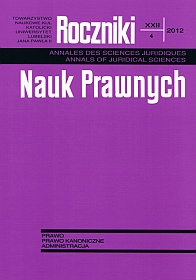A Case for Nullity of Sacred Ordination in the Current Provisions of the Latin Church
Abstract
The current legislation that regulates proceedings to declare nullity of a sacred ordination was laid down by Benedict XVI in his motu proprio Quaerit semper of 30 August 2011, according to which the competence to hear such cases, hitherto with the Congregation for Divine Worship and the Discipline of the Sacraments, was handed over to the Tribunal of the Roman Rota. Another special office, instituted with this tribunal, is moderated by the Dean of the Rota with the assistance of judicial vicars, deputy commissioners and consultors. The cases in question are heard in accordance with regulations determined by universtal law or the proper law of the Rota, congrua congruis referendo. CIC/83 devotes only 5 canons to matters concerning nullity cases.
The reasons for a declaration of nullity are listed in Book IV of CIC/83 entitled Function of the Church, in part I called Sacraments. These are: inability of a cleric to administer sacraments (can. 1012); inability of a candidate to receive them validly (cann. 124, 849, and 1024); unawareness or lack of intent in a candidate, resulting in a fictitious reception of holy orders; reception of holy orders under duress or grave fear that the candidate was unable to resist (cann. 125 §1; 1026); non-observance of an essential element of the ceremony of ordination (can. 1009). Moreover, as a juridic act, ordination must fulfill all requirements for the validity of such an act.
Apart from the interested party, i.e. the subject of ordination, an ordinary is entitled to register a complaint regarding the invalidity of this ordination. The validity of ordination can also be questioned by the promoter of justice in the diocese of a cleric's incardination or residence.
Having accepted a complaint concerning invalidity of ordination (fulfilling the provisions of cann. 1501-1504), the Tribunal of the Roman Rota decides upon a relevant action – administrative or judicial. In the former case, proceedings take place before a competent ordinary before the Rota adjudicates the matter. His duty is to personally supervise the preparation of a process. All evidence gathered at this stage, along with comments of the defender of the ordination, votum of the ordinary, and the instructor's report, is submitted to the Tribunal in three identical copies. The Tribunal accordingly institutes a college and decides the case by way of decree. By the power of a nullity decree, the interested party loses all his entitlements that belong to the clerical state and is excused from his duties.
If the Tribunal of the Rota decides upon judicial proceedings, its competent Office nominates a tribunal to deal with a case. A judicial decision in a nullity case becomes legally valid when two declarations of nullity have been issued. Upon the second pronouoncement a cleric loses his entitlements and is freed of duties pertaining to the clerical state.
Copyright (c) 2012 Roczniki Nauk Prawnych

This work is licensed under a Creative Commons Attribution-NonCommercial-NoDerivatives 4.0 International License.


